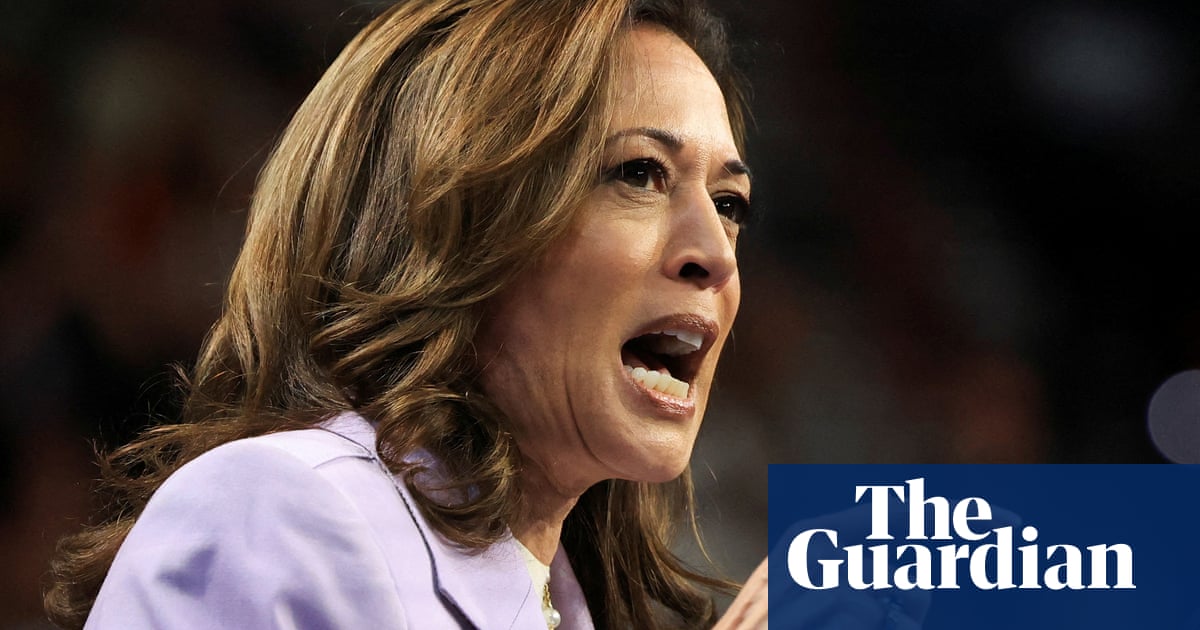Democratic nominee to draw contrast with Trump on tax and tariffs when she lays out details on Friday, aides say
Kamala Harris will announce plans to tackle high grocery costs by targeting corporations in the food and grocery industry, as she previews her economic agenda ahead of the November election.
She will also tackle prescription drug and housing costs, drawing a contrast with Trump on tariffs and taxes, according to a Harris campaign statement.
Harris is expected to lay out some details of her economic plan in a speech in North Carolina on Friday.
“Same values, different vision,” said one aide, describing how Harris’s economic agenda will compare with that of Joe Biden, who stepped aside as the Democratic presidential candidate last month.



I live in a large enough city to have choices and everyone is price gouging.
So, I don’t see how this would really help much tbh.
and having a strong and active FTC working to enforce price gouging laws would really help too.
That’s true. My point wasn’t a strong ftc is bad but that near monopolies aren’t the issue. There’s collusion happening and breaking up monopolies isn’t going to fix that.
A larger number of competitors has a natural tendency to make collusion more difficult. You are correct that the collusion needs to be aggressively addressed too. Ideally, that would just be a matter of strengthening and enforcing laws. But, I think increasing competition also helps create a market where collusion and price gouging are naturally much less likely.
Increasing competition is good but my point is that because this situation is an oligopoly rather than a monopoly, aggressive price/profit regulations for people’s basic needs and enforcement will get us further faster and have more staying power than trying to break up a half dozen mega corporations (especially with how involved they are in politics).
Preventing further market concentration, such as Albertsons/Kroger, is definitely needed. And breaking Amazon and Whole Foods up would be good. But it’s hard to argue that a monopoly is a monopoly when there’s three other oligopoly corporations nearby. Which will make breaking them up difficult.
Subsidizing small grocers and food suppliers while aggressively taxing megacorps would also create market incentives that would move us towards more competition.
Salient points. I’m sold.
You probably don’t remember the big fight over seat belts, but it was a thing. As a virtual hologram of a 1970’s Emergency Room doctor, I can tell you. The government mandating seat belts saved much more than lives. It saved trauma, years lost, careers, money - so much more.
But at the time people were all like, “What are they gonna do - force me to wear a seat belt? In my own car? How is that gonna help?”
It’s like that sometimes.
Same for air bags. They were going to make cars unaffordable. Same for drunk driving, “What? I can’t have a beer or two on the way home?!” (Actually, you can have a beer or two, you can’t be impaired.)
Remember drinking and driving? That was a whole thing too.
Geez so that’s why that cop was such a dick.
I’m for preventing monopolies and breaking them up.
My point wasn’t that that’s a bad thing. But that this is more of an oligopoly situation rather than a monopoly.
My town has Walmart, Kroger, Target, and a Co-OP within five minutes of my house. They’re all gouging prices and have been since the pandemic.
This isn’t a situation where breaking up monopolies is the cure. Though preventing the Kroger/Albertsons merger will certainly keep things from getting worse.
You listed three megacorps and a co-op as your local food suppliers. Those three megacorps set the market prices. If they were broken into the 50 smaller companies that they originally consumed or destroyed over the years, there could be real competition again, driving prices lower. It may be hard to imagine several smaller stores instead of just a few huge ones, but that was how things used to be many years ago. As a kid, I worked at a few of them that are now long extinct, having been consumed or destroyed by the megacorps.
It was a different landscape, where grocery stores aggressively competed on price with weekly and daily specials that were genuinely trying to undercut competitors. It was real. I saw it with my own eyes. Families would drive two blocks further down the street to a competitor because something was a tiny bit cheaper there that week. This sounds bizarre and foreign now because competition does not exist anymore. What exists now are megacorps.
The Kamala campaign is correct. The more that is done to create a competitive landscape, the lower prices will become. Can they really be broken up? Yes. Will they be broken up? I guess that depends on how much lobby money the megacorps are willing to spend.
Yes, but the term is oligopoly. And it requires different tactics than breaking up monopolies because they’re not a monopoly.
I made a longer post explaining here. Sorry if I’m coming off as pedantic but I find the distinction in this instance between oligopoly and monopoly important.
https://lemm.ee/post/39694050/14065675
This is excellent. Thank you.
Government can help a lot of the time, was my only aside there. But yes oligopoly busting would also be helpful.
Odd, but I have the opposite experience. Small hick town and I’m loaded with choices, most of which are cheap.